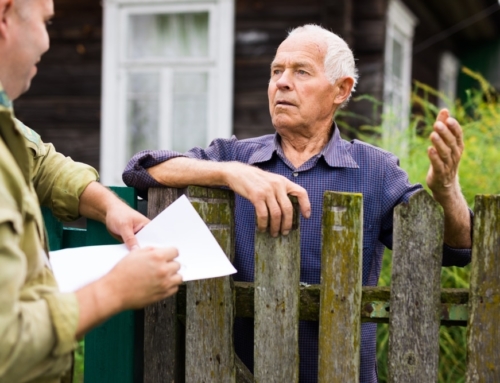Want to Conduct a House Raffle?
If you haven’t been able to sell your home, you might be thinking that if you raffle your house, you’ll have solved all your home selling problems.
But before you print out house raffle tickets on your printer, beware: Most house raffles are illegal unless the house is owned by a non-profit organization BEFORE you start the raffle.
UPDATED – READ MORE: House Raffle Is Possible for Some Sellers In Some States
Here’s how it should work:
- You’ll transfer title to the house to a nonprofit.
- The nonprofit will then pull the required permits from the local county sheriff’s office, as well as the mounds of paperwork that are required when conducting a raffle.
- The raffle will have to have rules written (preferably by an attorney) and scrupulous attention to detail is required.
- You’ll want to set up a website, figure out a way to accept PayPal or credit cards, and how you’re going to keep the books for the house raffle.
- Then, and only then, can you actually start selling tickets to raffle off your house.
A Nonprofit Has to Own the Property Before The House Raffle Starts
But let’s go back to the first point: You can’t even own your house personally while raffling it off. The possibility of scam artists having a go at this is so strong, that I haven’t found a state that will let you raffle off your own house. Instead, you have to give the house to a known charitable organization – one that is already a 501(c)3 – and take the tax deduction.
That’s right – you can’t benefit personally.
If you give the property to the charity and the charity raffles off your house, the charity has to benefit, not the former homeowner. You will get a substantial tax deduction, but if you need cash to pay off the mortgage for the house and buy another home to live in, this won’t work for you.
State Laws Prohibit Homeowners From Raffling Their Houses
Georgia, like almost all other states, prohibits anyone or any company except a nonprofit or an approved exemption from conducting a house raffle.
The Georgia laws says, “It is the intention of the General Assembly that only nonprofit, tax-exempt churches, schools, civic organizations, or related support groups; nonprofit organizations qualified under Section 501(c) of the Internal Revenue Code, as amended; or bona fide nonprofit organizations approved by the sheriff, which are properly licensed pursuant to this Code section shall be allowed to operate raffles.”
Nonprofit is defined as follows: “Nonprofit, tax-exempt organization” means churches, schools, civic organizations, or related support groups; nonprofit organizations qualified under Section 501(c) of the Internal Revenue Code, as amended; or bona fide nonprofit organizations approved by the sheriff.”
All states have a commercial gambling and raffle code on the books. The wording is fairly similar.
Don’t Get Caught in a House Raffle Scam
There are companies that claim to be able to conduct house raffles. The companies are not nonprofit 501(c)3 organizations and they don’t follow the law with how to conduct a raffle. In one case in Georgia, a woman was trying to raffle her house. She decided to sell 5,000 tickets for $100 each. She was working with a for-profit company in Florida.
Here’s how the deal was supposed to go down: She would sell atl east 3,500 raffle tickets. She would then transfer title to the Florida for-profit, which would take half of the proceeds (and pocket a quick $175,000) and then transfer the title to the property to whoever won the raffle.
This is illegal on several fronts. First, it violates Georgia state law that only nonprofits can conduct raffles. The Florida company is for-profit. And, it’s not located in Georgia. This deal, if it had been completed, could have been fraud, and the homeowner might have wound up in court – or jail.
Don’t Do a House Raffle – Instead, Consider a House Auction
The bottom line is clear: Don’t do a house raffle unless you’re working with a 501(c)3 organization and you have received thorough legal counsel.
If you want to get rid of your house, you might instead think about hiring a real estate auction company to auction off your property. You’ll be able to set a minimum price – so if the house doesn’t reach the minimum, you don’t have to sell – and you might get more than you think.
Best of all – it’s legal. House raffles are not.
Read More: Here’s a link to the charitable gaming laws in each state.
[amazon_link asins=’B01CQOV3YO,B0145EOFDO,B01MSTES8C,B016XTADG2′ template=’ProductCarousel’ store=’thinkglink-20′ marketplace=’US’ link_id=’fc4912bf-98d6-11e7-ba7f-f15c65e6abe5′]







What if the raffle were run in a country thet allows raflles?
Say your “Prize” house is in GA and the raffle is run from The Bahamas?
It may be legal in other countries, but the home is still subject to the laws in the state and country in which it is located. If title is transferred from the owner to the winner of the raffle outside the United States, there may be nothing that the local authorities may do. But if you have to sue to enforce the raffle terms, you may not find a court here willing to assist you.
So, what if I sold $10 tickets on vimeo to watch a movie about my house. I would only sell as many as the fair market value of the house was equal to (for example, $300,000 house, I’d sell 30,000 tickets MAX). I’d then offer to sell my house for $1 to one of the paid viewers. The $10 would technically be paying for their entertainment – not purchasing a raffle ticket. My selling the house for $1 would be my choice since my house would be paid in full.
To avoid breaking lottery or raffle laws your “movie” could not give the impression and or idea that they can win the house by doing this, or you would be breaking the law.
we are a nonprofit want to raffle a hhouse can you help us?
What if I sold raffle tickets for $100 a piece and I sold 6,000 raffle tickets. Could I take $150,000 and give it to Saint Judes children’s hospital, as a charitable donation and keep the rst for myself to purchase a new house.
No. You will be breaking the law.
Where does a DMV titled mobile home fall into this?
Is this a law in New York State also? You noted some states allow to raffle off their house.
Government and financial institutions want to keep people in debt. That’s one reason owners can not raffle their own property. This Country is corrupt. They write all the laws to benefit themselves, as well as corporate America.
Also, auctioning your home is not the way to go. Tried that on some properties did not get half of what the property was worth. Do better selling your self or with a realtor, then in auction. It is corrupt keeping it with auctioneers and realtors instead of giving options to the individuals.
Thank you so much for the “Raffling your house” information. I think it’s a damn shame we can’t raffle our own home but the law is the law.
Yes there is a law against it, A LAW PUT IN PLACE BY Relator’s to prevent you from going around them to sell your property. In some states they are trying to make Contract for DEED sales illegal. In my opinion a person should be able to sell their property anyway they choose, it is after all THEIR PROPERTY. Next thing you know we will have to go to a dealership to sell our old outdated cars.
Follow the money. Realtors would not be needed if we could raffle our own homes. It would effectively cripple the real estate business.
Connacht,
If you want to avoid using a Realtor (or real estate agent who is unaffiliated) there are other ways of doing it without going the route of a raffle. There are online and offline auction companies, and there are the new iBuyer programs through Zillow, OpenDoor, and others. And, you can always list your home for sale by yourself.
Ilyce
Can the property that is to be raffled be donated to a nonprofit 501(c)3 organization. The non-profit director is also the owner of the property that is to be donated. Would that be breaking the law. The property would then be a fundraiser for the non-profit.
I want to hear the answer to this question
Can you run a contest, such as an essay contest and charge an administrative or entrance fee?